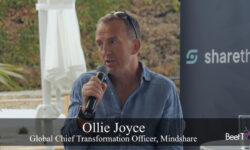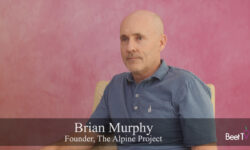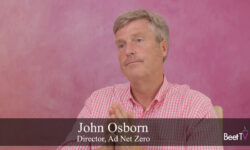CANNES — In the quest for a sustainable digital advertising landscape, the industry is looking for ways to count and reduce carbon emissions attributed to ad practices.
Anthony Katsur, CEO of IAB Tech Lab, is spearheading initiatives to reduce the carbon footprint of digital advertising.
In this video interview with Ad Net Zero U.S. director John Osborn for Beet.TV at Cannes Lions 2023, Katsur explains how to get there.
“Sustainability Playbook” in Action
Katsur emphasizes the role of the Tech Lab’s recently released “Sustainability Playbook” in guiding companies towards environmentally friendly practices in digital advertising. “Read it, put it to use, deploy it,” he urges. “Advertisers, brands demand the use of some of the key best practices in there.”
The playbook identifies simple yet impactful practices, such as “lazy load” – not loading an ad onto a page if it’s not in view.
As Katsur explains, “Every time an ad impression is processed, it burns carbon, it uses energy, it uses bandwidth, it uses CPU cycle, it uses disc, it uses IO. All of these things use energy and therefore burn carbon.”
Lazy Load & SupplyChain Nodes: IAB Tech Lab Aims To Green The Ad Landscape
Counting the Hops
Another critical practice is “counting the hops” – tracking how many times an impression is processed. Katsur explains that every time an impression is touched, it burns carbon. Therefore, reducing the number of “hops” can significantly decrease the carbon footprint of digital ads.
Katsur points out that while there can be legitimate reasons for multiple hops, excessive processing is likely indicative of fraud. He says: “We introduced what’s called the SupplyChain object about three years ago. That’s been marginally adopted.
“But a quick fix is if the industry, if advertisers pound the table… and demand the use of the SupplyChain object and reporting against that, that would immediately cut down the number of times an impression is processed through our industry.”
Check out IAB Tech Lab’s Sustainability Playbook as part of our continuous effort to assist the #DigitalAdvertising industry in reducing carbon emissions with #sustainable media best practices! https://t.co/TKHZjfCZLc pic.twitter.com/BLaco6L6sN
— IAB Tech Lab (@IABTechLab) June 30, 2023
Collaboration is Key
To achieve these goals, the IAB Tech Lab is working in collaboration with various industry players like AdNet Zero and GAR. “We’ve established swim lanes in terms of what’s Ad Net Zero focused on, what’s Tech Lab focused on, what’s GAR focused on?” Katsur says. This collaboration ensures that efforts are harmonious and not duplicated.
Katsur also touched on the potential role of AI in sustainability efforts. While acknowledging that AI is a “data beast” that consumes a lot of energy, he also sees its promise in areas like privacy, identity, and addressing the need for constant cookie matching.
He notes: “With the third-party cookie ostensibly going away anyway, that’s going to happen. But things like data clean rooms, first-party data collaboration, I think AI holds a tremendous amount of promise where you match once.”
Looking Ahead
Looking forward, Katsur hopes to establish baseline metrics for the industry’s carbon footprint.
“You can’t manage what you can’t measure,” he says, emphasizing the need for standardization.
He concludes, “I don’t think we can play around with that when it comes to sustainability issues for the planet.”
You’re watching coverage of the Sustainability & Responsible Marketing Summit at Cannes Lions 2023, presented by Adlook & Sharethrough. For more videos from Beet.TV’s Cannes Lions 2023 coverage, please visit this page.













































